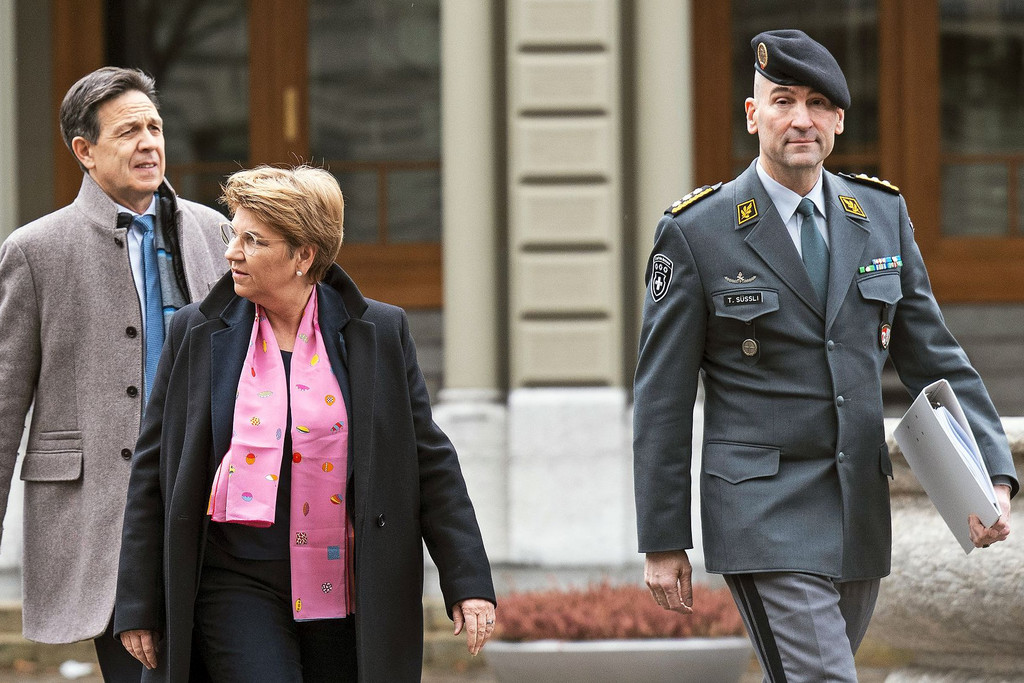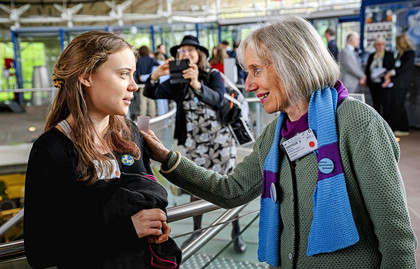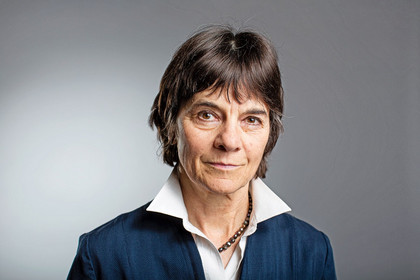
Triumphant ‘climate seniors’ cause a stir

The big wolf hunt in the Swiss mountains

News

What has Switzerland learned from the Credit Suisse debacle?

News

More money for defence, less for foreign aid

News


A group of older Swiss women have won their climate case at the European Court of Human Rights. Not everyone in Switzerland is happy with the verdict. The ruling will encourage environmental groups across Europe to bring similar actions against their own governments.
A group of older Swiss women triumphed in Strasbourg at the beginning of April when their landmark climate case was largely upheld by the European Court of Human Rights (ECtHR). “It is the biggest victory possible for us. We still can’t really believe it,” Rosmarie Wydler-Wälti told Swiss public television (SRF) immediately after the verdict. The group of ‘climate seniors’, or Senior Women for Climate Protection (Klimaseniorinnen), received moral and financial support from Greenpeace during the proceedings.

The judges in Strasbourg ruled that Switzerland had violated the women’s human rights by not doing enough to combat global warming. This relates specifically to Article 8 of the European Convention on Human Rights (ECHR), which guarantees “the right to respect for private and family life”. The court expanded on Article 8 in reference to climate change, saying that states must take appropriate steps to prevent global temperatures from reaching levels that would do serious and irreparable harm to human rights.
The court found that there had been “critical gaps” in the process of putting in place the relevant domestic regulatory framework, and that the Swiss authorities had failed to quantify national limits on greenhouse gas emissions. The judges also stated that Switzerland had failed to meet its past CO2 reduction targets.
The verdict sets a European precedent as it is the first time an international court has tied human rights directly to climate change. The 46 states of the Council of Europe could now be required by their citizens to rethink climate policy and, where necessary, ramp up climate action to protect human rights.
The judges made no specific reference to what steps Switzerland should take, saying that it was not their responsibility to prescribe to Switzerland how it should achieve its climate goals. They considered that the Swiss Confederation itself should assess the specific measures to be taken, and present these to the Council of Europe Committee of Ministers. Essentially, it is the job of the Committee of Ministers to supervise the adoption of measures aimed at ensuring that individual member states comply with the ECHR.
As a first step, the Klimaseniorinnen group now wants the Federal Council to order an expert-led review of Switzerland’s climate goals, taking the national carbon budget and the remaining global carbon budget into account.
Wydler-Wälti and her fellow plaintiffs were jubilant and relieved after the ECtHR ruling. But the reaction from other quarters was less complimentary, including from those who are actually in favour of doing more to fight climate change. Green Party member and former federal judge Brigitte Pfiffner told the “SonntagsZeitung” that the ECtHR had overstepped its authority by overriding domestic legislation as well as direct democracy. Pfiffner is alluding to the referendum in 2021, when voters rejected a beefed-up CO2 Act that would have introduced an air ticket levy. She believes the ECtHR is interfering in domestic politics instead of following the wording of the Convention.

Pfiffner also said that the judges failed to adequately explain why a civil society group (the KlimaSeniorinnen) was suddenly entitled to sue, and which human rights were specifically violated. Furthermore, the judges failed to convincingly demonstrate how Swiss climate policy had impaired the group’s right to privacy and family life under Article 8 of the ECHR.
The court took a relatively straightforward line as to whether there is a causal link between gaps in Swiss regulations and the higher temperatures and heatwaves referred to in the case. It said that a state is liable if its relevant authorities would have had a realistic chance of changing the outcome or mitigating adverse effects by taking reasonable measures. But even if Switzerland had cut greenhouse emissions to zero, this would not have curbed the global rise in temperatures – because the amount that Switzerland contributes to global carbon emissions is a relative drop in the ocean.
Critics fear the ruling will lead to human rights being trivialised and politicised. Applying legally binding human rights protections to controversial issues such as climate change also means using these protections as a political tool, they say. Others think differently. According to Markus Schefer, an expert in constitutional law at the University of Basel, the ruling is a “logical continuation” of existing provisions. Schefer told the “NZZ am Sonntag” that applying a broad wording in relation to fundamental rights had future-proofed the ECHR, and that courts have an important duty to take new threats and risks into account.
However, the ruling could also undermine climate action. There is a danger that some voters could reject future climate initiatives not because of the issues at stake, but because they want to send a message to Strasbourg rejecting the influence of ‘foreign judges’. And an altogether different side-effect: the verdict is likely to further dampen the already tricky prospects of Berne striking an institutional agreement with the EU.
Indeed, the ruling has caused a stir in Berne, with the legal affairs committees of both chambers of parliament, no less, urging the Federal Council not to implement the judgment – a remarkable thing for elected politicians to do in a country that follows the rule of law.
Looking ahead, there is a likelihood that other environmental organisations around Europe will be buoyed by the Strasbourg ruling and take their own climate cases to the ECtHR. For example, environmental group Deutsche Umwelthilfe now believes that its case against the German government, which it took to the ECtHR in 2022, has a realistic chance of success.
For further background information, read our piece on Rosmarie Wydler-Wälti at www.revue.link/climate
Comments
Comments :
J'apprécie beaucoup la Revue Suisse mais j'ai été choqué par le parti-pris de l'article rapportant le jugement de la Cour européenne des droits de l'homme en faveur des Aînées pour le climat. Cet article est à charge et ne prend pas la peine de rappeler l'ampleur de l'enjeu: toutes les régions du monde sont menacées par le dérèglement climatique en cours et la situation s'aggrave année après année. La Suisse contribue plus que la plupart des autres pays avec une empreinte carbone moyenne d'un habitant de la Suisse qui dépasse les 10 t/an alors que la neutralité carbone à laquelle il faut arriver au plus vite est à 2 t/an environ.
Les arguments avancés pour critiquer le jugement sont inacceptables: dire, par exemple, que même si la Suisse avait réduit à zéro ses émissions de GES, cela n'aurait pas freiné la hausse des températures est un argument éculé régulièrement utilisé par ceux qui veulent freiner toute action climatique. C'est comme si une personne condamnée pour ne pas avoir payé ses impôts relativisait en disant que cela ne changerait pas le budget du pays. Tous les pays doivent contribuer à l'effort et ceux qui ont l'empreinte la plus élevée par habitant, plus que les autres. La Suisse ne fait pas un effort suffisant, malgré ses engagements internationaux (accords de Paris) et les conséquences pour sa population. Il est donc normal qu'elle soit condamnée et la réaction de la classe politique montre qu'elle n'est pas à la hauteur des enjeux.
Diese Seniorinnen sollten sich mal in Asien rumschauen. Da wäre viel zu tun für den Klimaschutz. Aber es interessiert keinen, weil man kein Geld damit macht. In der Schweiz wird genug fürs Klima gemacht. Hinter diesen Damen wird eine ganz andere Gruppe stecken.
Im Krieg ist die Lüge eine Waffe. Aber der WW2 ist schon längst vorüber. Warum glauben wir immer noch den Lügen unserer Feinde? Warum werden wir, die wir uns für die Wahrheit einsetzen noch immer verfolgt, verurteilt und bestraft? Die Antwort ist, weil der Feind keine Pressefreiheit will, das gilt auch für uns.